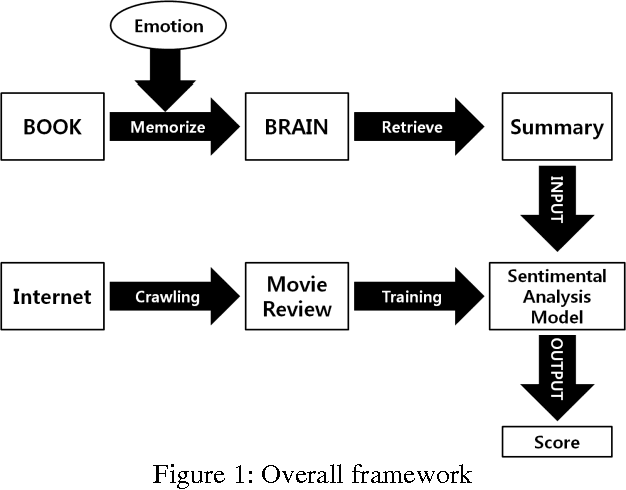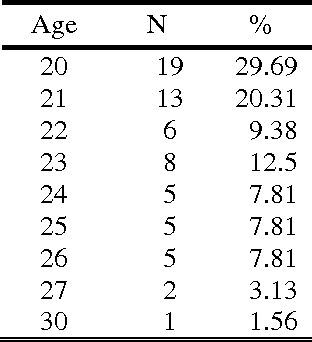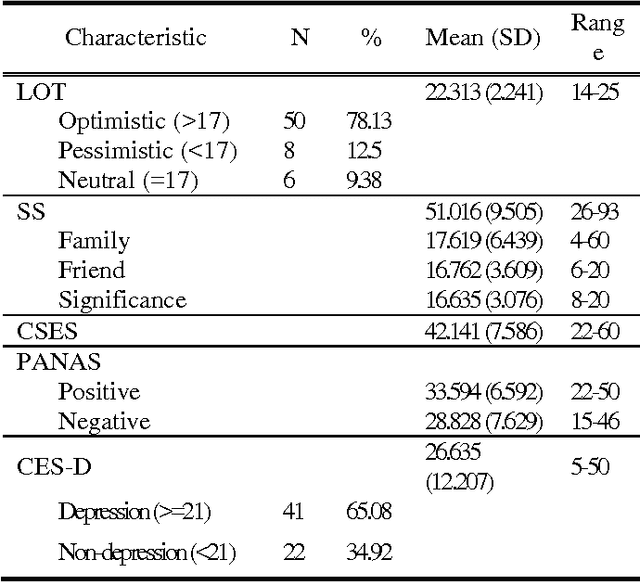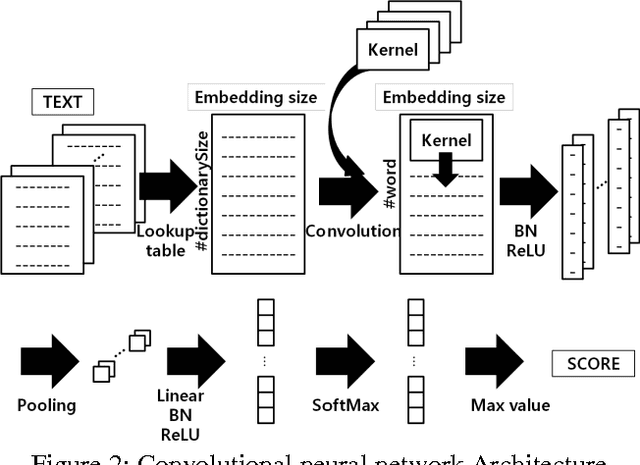Jeong Ryu
What we really want to find by Sentiment Analysis: The Relationship between Computational Models and Psychological State
Jun 03, 2018



Abstract:As the first step to model emotional state of a person, we build sentiment analysis models with existing deep neural network algorithms and compare the models with psychological measurements to enlighten the relationship. In the experiments, we first examined psychological state of 64 participants and asked them to summarize the story of a book, Chronicle of a Death Foretold (Marquez, 1981). Secondly, we trained models using crawled 365,802 movie review data; then we evaluated participants' summaries using the pretrained model as a concept of transfer learning. With the background that emotion affects on memories, we investigated the relationship between the evaluation score of the summaries from computational models and the examined psychological measurements. The result shows that although CNN performed the best among other deep neural network algorithms (LSTM, GRU), its results are not related to the psychological state. Rather, GRU shows more explainable results depending on the psychological state. The contribution of this paper can be summarized as follows: (1) we enlighten the relationship between computational models and psychological measurements. (2) we suggest this framework as objective methods to evaluate the emotion; the real sentiment analysis of a person.
Psychological State in Text: A Limitation of Sentiment Analysis
Jun 03, 2018


Abstract:Starting with the idea that sentiment analysis models should be able to predict not only positive or negative but also other psychological states of a person, we implement a sentiment analysis model to investigate the relationship between the model and emotional state. We first examine psychological measurements of 64 participants and ask them to write a book report about a story. After that, we train our sentiment analysis model using crawled movie review data. We finally evaluate participants' writings, using the pretrained model as a concept of transfer learning. The result shows that sentiment analysis model performs good at predicting a score, but the score does not have any correlation with human's self-checked sentiment.
Re-presenting a Story by Emotional Factors using Sentimental Analysis Method
Jul 13, 2016



Abstract:Remembering an event is affected by personal emotional status. We examined the psychological status and personal factors; depression (Center for Epidemiological Studies - Depression, Radloff, 1977), present affective (Positive Affective and Negative Affective Schedule, Watson et al., 1988), life orient (Life Orient Test, Scheier & Carver, 1985), self-awareness (Core Self Evaluation Scale, Judge et al., 2003), and social factor (Social Support, Sarason et al., 1983) of undergraduate students (N=64) and got summaries of a story, Chronicle of a Death Foretold (Gabriel Garcia Marquez, 1981) from them. We implement a sentimental analysis model based on convolutional neural network (LeCun & Bengio, 1995) to evaluate each summary. From the same vein used for transfer learning (Pan & Yang, 2010), we collected 38,265 movie review data to train the model and then use them to score summaries of each student. The results of CES-D and PANAS show the relationship between emotion and memory retrieval as follows: depressed people have shown a tendency of representing a story more negatively, and they seemed less expressive. People with full of emotion - high in PANAS - have retrieved their memory more expressively than others, using more negative words then others. The contributions of this study can be summarized as follows: First, lightening the relationship between emotion and its effect during times of storing or retrieving a memory. Second, suggesting objective methods to evaluate the intensity of emotion in natural language format, using a sentimental analysis model.
 Add to Chrome
Add to Chrome Add to Firefox
Add to Firefox Add to Edge
Add to Edge